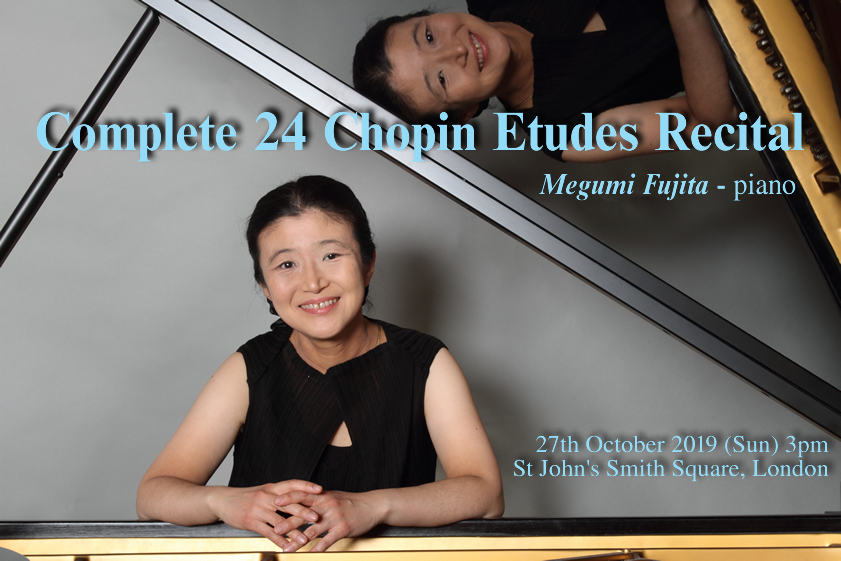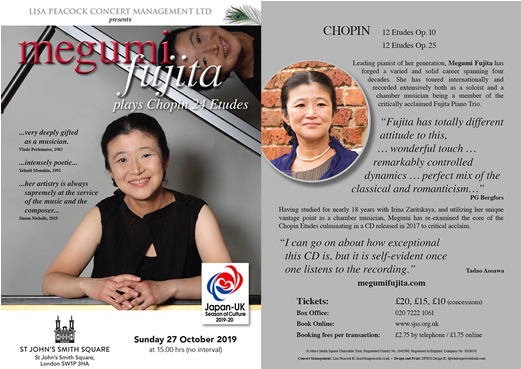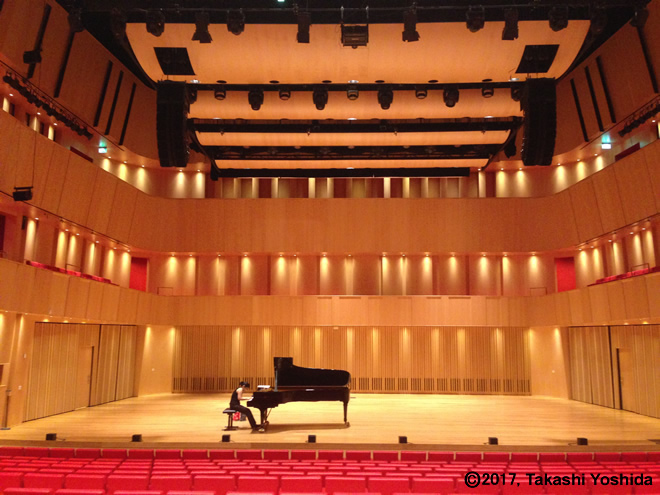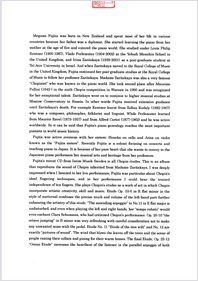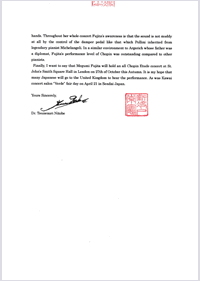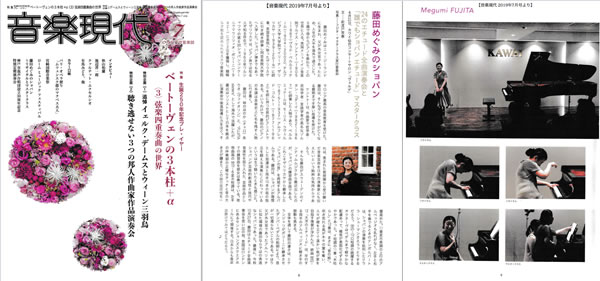
ショパン24のエチュード全曲演奏会
12
Etudes Op.10, 12 Etudes Op.25
2019年10月27日(日)15時
国会議事堂やビッグベン近くの
ロンドンのセント・ジョンズ スミス・スクエア
St
John's Smith Square, London
2020年1月12日
昨年10月27日にロンドンでショパン24エチュードの全曲演奏会を行いましたが、
そのご批評がイギリスの音楽誌Musical
Opinion誌の最新号(1月〜3月)に出ました!
(全文掲載についてご許可頂きました。)
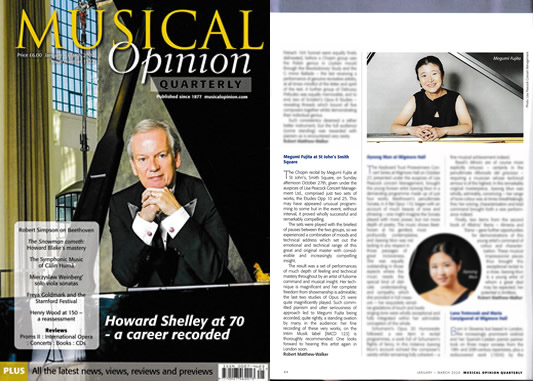
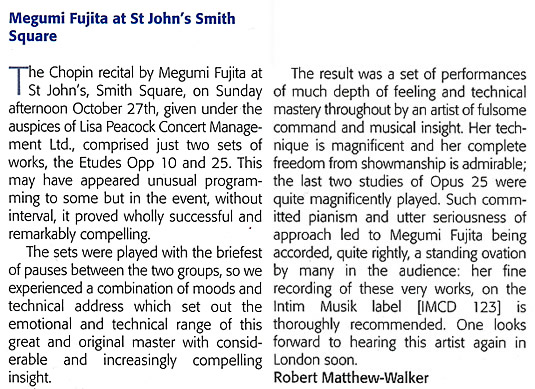
Musical Opinion Quarterly Jan-Mar 2020 Number 1522 P44より <参考和訳>
藤田めぐみ セント ジョンズ スミス スクエア(St
John’s Smith Square)藤田めぐみによるショパン リサイタルが10月27日(日)午後3時にLisa
Peacock Concert Managementの主催で英国ロンドンのSt
John’s Smith Squareで開催されたが、それは2組の作品集である練習曲集(Etudes)作品10と作品25のみを対象としたものだった。
これは人によっては かわったプログラムに見えたかもしれない。しかし終わってみると、それもインターヴァル無しで、このプログラムは大成功であり、際立って 心を引きつける力があることが証明された。
この二つの作品集はそれぞれの作品集の間にほとんど中断を入れずに演奏された。そのことにより我々が経験したことは、心情の諸相と演奏技術のひとつの結合体(a combination of moods and technical address)であり、それは この偉大なそして独創的なマスター(ショパン)の感情と演奏技術の連なり(the emotional and technical range)を 相当な、しかも心がどんどん引きつけられるような洞察で示すものであった。
つまり、統制力に優れ、音楽的な洞察を持ったひとりの芸術家(an artist)による非常に深い情感と隅々にまで行き渡る熟達の演奏技術が合わさった一連の演奏であったということである。彼女のテクニックはこの上なく素晴らしく(magnificent)、しかも彼女がショーマンシップとは完全に無縁であることは敬服に価する。作品25の最後の2曲は全くこの上なく素晴らしく演奏された。
このような献身的なピアニズムと徹底して真剣なアプローチにより藤田めぐみに聴衆の多くからスタンディングオベーションがおくられたことは至極正当なことであった。
Intim Musikレーベル[IMCD 123]での今回のまさにこれらの作品の彼女の優れたレコーディングCDは絶対お奨め(thoroughly recommended)である。近いうちにロンドンでまたこの芸術家を聴きたいものだ。
ロバート マシューウォーカー(Robert Matthew-Walker)
2019年12月14日
音楽現代誌2020年1月号に藤田めぐみのショパン24エチュード全曲コンサートの批評が載りました!
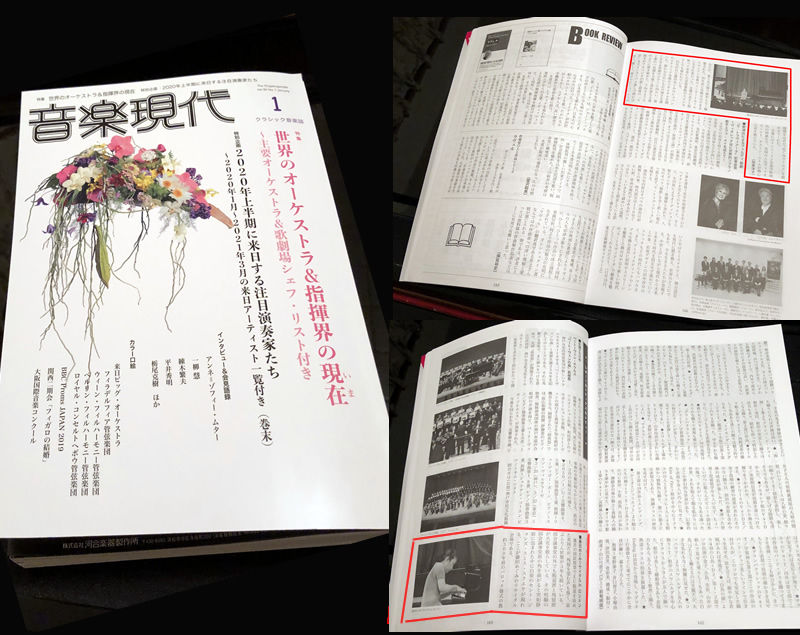
Ongaku Gendai Magazine Jan 2020 PDF
≪日英文化季間 2019-2020≫
英国における日本文化季間認定事業
英国における日本文化季間について
Megumi Fujita Piano Recital, Complete 24 Etudes by Frédéric Chopin
【プロフィール】
藤田 めぐみ (ピアノ) ニュージーランド生まれ。
14才で英国メニューイン音楽学校に留学。巨匠メニューインと共演。イスラエルのテルアビブ大学大学院、英国王立音楽大学大学院卒。サイモン・ニコルズ、ルイス・ケントナー、ヴラド・ペルルミュテール、イリナ・ザリツカヤ、アレクサンドラ・アンドリエフスキーに師事。
ベーゼンドルファー国際ピアノコンクール第3位、モントリオール国際ピアノコンクール第4位、ショパン国際ピアノコンクールディプロマ及びショパン奨学基金委員会賞など多数のコンクールで入賞。PTNAピアノコンペティション特級銀賞受賞。
ラフマニノフ24の前奏曲及びベートーヴェン、ラヴェル、ラフマニノフのピアノ作品集、ショパン 24のエチュードのCD 3枚をスウェーデンのIntim Musikレーベルでリリース。
名ピアニスト、 イリナ・ザリツカヤ(ポリーニの優勝したショパン・コンクールで2位)のもとで18年近く研鑽を積む。日本演奏連盟正会員。 日本ショパン協会正会員。 全日本ピアノ指導者協会(ピティナ)正会員。
・CD Chopin 24 Etudes Op 10 & Op 25 レーベル:スウェーデン INTIM MUSIK 2016年11月 録音
・ライブ演奏You Tubeフジタ・ピアノトリオHP をご参照下さい。
Op.10 No.2, No.5-7 2017年10月 スウェーデンでの全曲演奏会より
Op.25 No.5 & No.6 2017年 9月 日本ショパン協会第278回例会での全曲演奏会より
(於 カワイ表参道「パウゼ」)
Letter from the late Vlado Perlemuter
13th October 1983
To whom it may concernIt is a pleasure for me to recommend the young pianist Megumi Fujita who in my opinion has a very good future before her. She has already a very good technique and she is very deeply gifted as a musician.
Vlado Perlemuter
Letter from the late Lord Menuhin
25 February 1991
To whom it may concernI have known Megumi Fujita for several years, both as a pupil of my school and as a musician with whom I have played on a number of occasions. She has very special pianistic and musical gifts and is a delightful young lady. Her sincerity and deep commitment communicate themselves to audiences, who always respond to her performance with great warmth and enthusiasm. Megumi Fujita is a remarkable young musician whose playing combines brilliance and drama with intensly poetic lyrical qualities.
Yehudi Menuhin
Letter from Simon Nicholls29th May 2019
Megumi Fujita is a pianist of high artistic achievement, who communicates in her playing insights of rare significance. In her performances her artistry is always supremely at the service of the music and the composer; a strong interpretive personality creates a sense of communication with each member of the audience.
Simon Nicholls
Japanese Ongaku Gendai Magazine Article
(English Translation)“Ongaku Gendai” Magazine July,2019
Chopin by Megumi Fujita
Complete 24 Chopin Etude Recital
and ‘Chopin Etudes for everyone’ Masterclass
(at Kawai Sendai, Concert Salon “Verde” on 21st April, 2019)Megumi Fujita was born in New Zealand and spent most of her life in various countries because her father was a diplomat. She started learning the piano from her mother at the age of five and entered the piano world. She studied under Louis Philip Kentner (1905-1987), Vlado Perlemuter (1904-2002) at the Yehudi Menuhin School in the United Kingdom, and Irina Zaritskaya (1939-2001) as a post-graduate student at Tel Aviv University in Israel.
And when Zaritskaya moved to the Royal College of Music in the United Kingdom, Fujita continued her post-graduate studies at the Royal College of Music to follow her professor Zaritskaya. Madame Zaritskaya was also a very famous "Chopinist'' who was known in the piano world. She took second place after Maurizio Pollini (1942-) in the sixth Chopin competition in Warsaw in 1960 and was recognized for her exceptional talent. Zaritskaya went on to continue to higher musical studies at Moscow Conservatory in Russia.
In other words Fujita received extensive guidance until Zaritskaya's death. For example Kentner learnt from Zoltan Kodaly (1882-1967) who was a composer, philosopher, folklorist and linguist. While Perlemuter learned from Maurice Ravel (1875-1937) and from Alfred Cortot (1877-1962 ) and he was active worldwide. So it can be said that Fujita's piano genealogy reaches the most important pianists in world music history.
Fujita was active overseas with her sisters ; Honoka on cello and Arisa on violin known as the "Fujita sisters". Recently Fujita is a soloist focusing on concerts and teaching piano in Japan. It is because of her pure heart that she wants to convey to the Japanese piano performers her musical arts and heritage from her professors.
Fujita's recent CD from Intim Musik Sweden is all Chopin études. This is an album that reproduces the sound of Chopin inherited from Madame Zaritskaya. I was deeply impressed when I listened to her live performance, Fujita was particular about Chopin's ideal fingering techniques, and in her performance I could hear the trained independence of ten fingers. She plays Chopin's etudes as a work of art in which Chopin incorporate artistic creativity, skill and music.
Etude Op. 10-6 in E flat minor in the style of nocturnal combines the precise touch and volume of the left -hand part further enhancing the artistry of this etude. "The ascending arpeggio" in No.11 in E flat major is undisturbed, and even when playing the left and right hands, her "tempo rubato" would even enchant Clara Schumann, who had criticized Chopin's performance. Op. 25-10 "the octave jumping'' in B minor was very refreshing with careful consideration not to make any unwanted noise with the pedal Etude No. 11 "Etude of the tree wilt' ' and No. 12 are exactly "pictures of sound ". The wind that blows the leaves off the trees and the scene of people raising their collars and pining for their warm homes. The final Etude, Op. 25-12 "Ocean Etude" increases the heart at of the listener in the parallel arpeggio of both hands.
Throughout her whole concert Fujita's awareness is that the sound is not muddy at all by the control of the damper pedal like that which Pollini inherited from legendary pianist Michelangeli. In a similar environment to Argerich whose father was a diplomat, Fujita's performance level of Chopin was outstanding compared to other pianists.
Finally, I want to say that Megumi Fujita will hold an all Chopin Etude concert at St. John's Smith Square Hall in London on 27th of October this autumn. It is my hope that many Japanese will go to the United Kingdom to hear the performance. As was Kawai concert salon "Verde" fair day on April 21 in Sendai Japan.
Yours Sincerely,
Dr. Tsunenori Nitobe
copyright©2019 Fujita Piano Trio all rights reserved.
